Related Research Articles
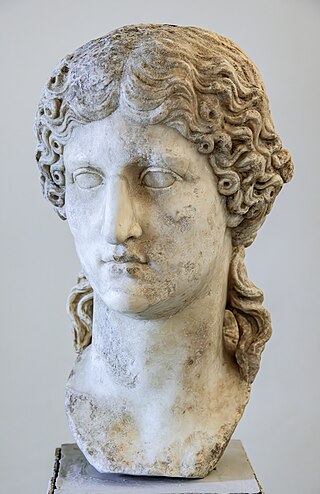
(Vipsania) Agrippina the Elder was a prominent member of the Julio-Claudian dynasty. She was the daughter of Marcus Vipsanius Agrippa and Augustus' daughter, Julia the Elder. Her brothers Lucius and Gaius Caesar were the adoptive sons of Augustus, and were his heirs until their deaths in AD 2 and 4, respectively. Following their deaths, her second cousin Germanicus was made the adoptive son of Tiberius, Augustus' stepson, as part of the succession scheme in the adoptions of AD 4. As a result of the adoption, Agrippina was wed to Germanicus in order to bring him closer to the Julian family.

Julia Agrippina, also referred to as Agrippina the Younger, was Roman empress from AD 49 to 54, the fourth wife and niece of emperor Claudius, and the mother of Nero.

Tiberius Claudius Caesar Augustus Germanicus was a Roman emperor, ruling from AD 41 to 54. A member of the Julio-Claudian dynasty, Claudius was born to Drusus and Antonia Minor at Lugdunum in Roman Gaul, where his father was stationed as a military legate. He was the first Roman emperor to be born outside Italy.
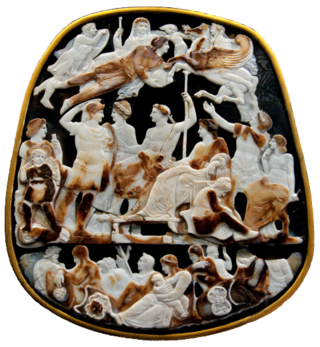
The Julio-Claudian dynasty comprised the first five Roman emperors: Augustus, Tiberius, Caligula, Claudius, and Nero.

Tiberius Julius Caesar Augustus was Roman emperor from AD 14 until 37. He succeeded his stepfather Augustus, the first Roman emperor. Tiberius was born in Rome in 42 BC to Roman politician Tiberius Claudius Nero and his wife, Livia Drusilla. In 38 BC, Tiberius' mother divorced his father and married Augustus. Following the untimely deaths of Augustus' two grandsons and adopted heirs, Gaius and Lucius Caesar, Tiberius was designated Augustus' successor. Prior to this, Tiberius had proved himself an able diplomat, and one of the most successful Roman generals: his conquests of Pannonia, Dalmatia, Raetia, and (temporarily) parts of Germania laid the foundations for the empire's northern frontier.
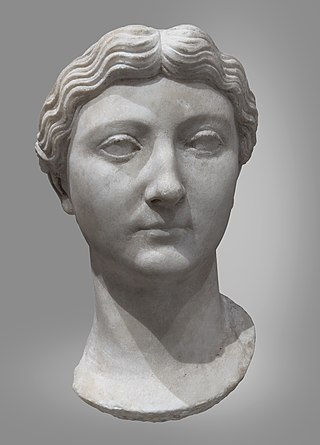
Livia Drusilla was Roman empress from 27 BC to AD 14 as the wife of emperor Augustus. She was known as Julia Augusta after her formal adoption into the Julian family in AD 14.
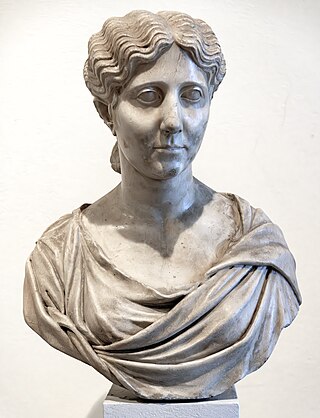
Antonia Minor was the younger of two surviving daughters of Mark Antony and Octavia Minor. She was a niece of the Emperor Augustus, sister-in-law of the Emperor Tiberius, paternal grandmother of the Emperor Caligula and Empress Agrippina the Younger, mother of the Emperor Claudius, and maternal great-grandmother of the Emperor Nero. She outlived her husband Drusus, her oldest son, her daughter, and several of her grandchildren.
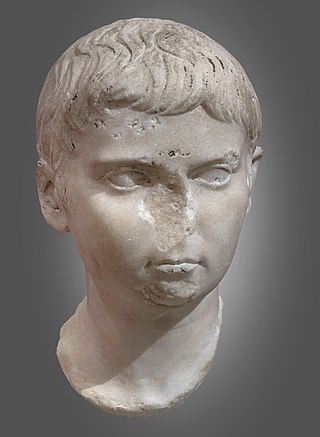
Marcus Agrippa Postumus, later named Agrippa Julius Caesar, was a grandson of Roman Emperor Augustus. He was the youngest child of Marcus Vipsanius Agrippa and Julia the Elder. Augustus initially considered Postumus as a potential successor and formally adopted him as his heir, before banishing Postumus from Rome in AD 6 on account of his ferocia. In effect, though not in law, the action cancelled his adoption and virtually assured Tiberius' emplacement as Augustus' sole heir. Postumus was ultimately executed by his own guards shortly after Augustus' death in AD 14.

Lucius Aelius Sejanus, commonly known as Sejanus, was a Roman soldier, friend, and confidant of the Roman Emperor Tiberius. Of the Equites class by birth, Sejanus rose to power as prefect of the Praetorian Guard, the imperial bodyguard, of which he was commander from AD 14 until his execution for treason in AD 31.
Aulus Cremutius Cordus was a Roman historian. There are very few remaining fragments of his work, principally covering the civil war and the reign of Augustus. In AD 25 he was forced by Sejanus, who was praetorian prefect under Tiberius, to take his life after being accused violating the lex maiestas.
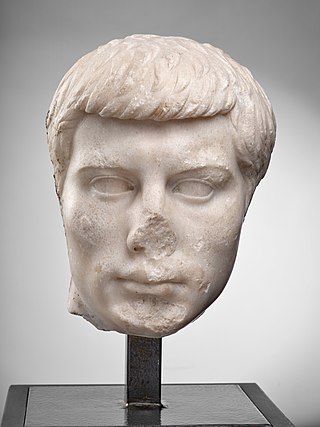
Tiberius Julius Caesar Nero, known as Tiberius Gemellus, was the son of Drusus and Livilla, the grandson of the Emperor Tiberius, and the cousin of the Emperor Caligula. Gemellus is a nickname meaning "the twin". His twin brother, Germanicus Gemellus, died as a young child in AD 23. His father and older cousins died, and are suspected by contemporary sources as having been systematically eliminated by the powerful praetorian prefect Sejanus. Their removal allowed Gemellus and Caligula to be named joint-heirs by Tiberius in 35, a decision that ultimately resulted in Caligula assuming power and having Gemellus killed in late 37 or early 38.

Claudia Livia was the only daughter of Nero Claudius Drusus and Antonia Minor and sister to Roman Emperor Claudius and general Germanicus, and thus paternal aunt of emperor Caligula and maternal great-aunt of emperor Nero, as well as the niece and daughter-in-law of Tiberius. She was named after her grandmother, Augustus' wife Livia Drusilla, and commonly known by her family nickname Livilla. She was born after Germanicus and before Claudius.

Drusus Julius Caesar, also called Drusus the Younger, was the son of Emperor Tiberius, and heir to the Roman Empire following the death of his adoptive brother Germanicus in AD 19.

Drusus Caesar was the adopted grandson and heir of the Roman emperor Tiberius, alongside his brother Nero. Born into the prominent Julio-Claudian dynasty, Drusus was the son of Tiberius' general and heir, Germanicus. After the deaths of his father and of Tiberius' son, Drusus the Younger, Drusus and his brother Nero Caesar were adopted together by Tiberius in September AD 23. As a result of being heirs of the emperor, he and his brother enjoyed accelerated political careers.

Julia Livia, was the daughter of Drusus Julius Caesar and Livilla, and granddaughter of the Roman Emperor Tiberius. She was also a first cousin of the emperor Caligula, and niece of the emperor Claudius.

Nero Julius Caesar was the adopted grandson and heir of the Roman emperor Tiberius, alongside his brother Drusus. Born into the prominent Julio-Claudian dynasty, Nero was the son of Tiberius' general and heir, Germanicus. After the deaths of his father and of Tiberius' son, Drusus the Younger, Nero and his brother Drusus were adopted together by Tiberius in September AD 23. As a result of being heirs of the emperor, he and his brother enjoyed accelerated political careers.
Quintus Junius Blaesus was a Roman politician who lived during the reigns of Augustus and Tiberius. He was the maternal uncle of Lucius Aelius Sejanus, the Praetorian Prefect of Emperor Tiberius.
Ennia Thrasylla was a Roman noblewoman who lived in the 1st century AD in the Roman Empire.
LuciusFulcinius Trio was a Roman senator who came from a plebeian family. Trio was an active prosecutor (delator) during the reign of Tiberius who developed a reputation for making accusations. He was governor of Lusitania from about 21 to 31, before returning to Rome to hold the office of consul suffect with Publius Memmius Regulus in 31. His friendship with Sejanus would lead to allegations that ended with his suicide in early 35.
References
- ↑ Flower, Harriet I. (2006). The Art of Forgetting: Disgrace & Oblivion in Roman Political Culture. Univ of North Carolina Press. p. 181. ISBN 9780807830635.
- ↑ Bellemore, Jane (1995). "The Wife of Sejanus". Zeitschrift für Papyrologie und Epigraphik. 109: 255–266. JSTOR 20189651.
- ↑ Cassius Dio, Roman History 58.11
- 1 2 Robin, Seager (2008). Tiberius. Blackwell Ancient Lives (2 ed.). Wiley-Blackwell. pp. 156, 188. ISBN 9780470775417 . Retrieved 2016-02-27.
- ↑ Tacitus, Annals 4.3, 11
- ↑ Levick 1999 , p. 127
- ↑ Wood, Susan E. (2000). "Imperial Women: A Study in Public Images, 40 B.c. - A.d. 68". Mnemosyne . 194. Brill Publishers: 182. ISBN 9789004119697 . Retrieved 2016-02-27.
- 1 2 Lightman, Marjorie; Lightman, Benjamin (2008). "Apicata". A to Z of Ancient Greek and Roman Women. Facts on File library of world history. Infobase Publishing. p. 32. ISBN 9781438107943 . Retrieved 2016-02-27.
- ↑ https://penelope.uchicago.edu/Thayer/E/Roman/Texts/Tacitus/Annals/4A*.html, Ann. 4.11
- 1 2 Cassius Dio Histories 58.11.7
- ↑ Levick, Barbara (2003). Tiberius the Politician. Roman Imperial Biographies (2, revised ed.). Routledge. pp. lxxvi. ISBN 9781134603787 . Retrieved 2016-02-27.
- ↑ van Hooff, Anton J. L. (2002). From Autothanasia to Suicide: Self-killing in Classical Antiquity. Routledge. ISBN 9781134953783 . Retrieved 2016-02-27.
![]() This article incorporates text from a publication now in the public domain : Schmitz, Leonhard (1870). "Apicata". In Smith, William (ed.). Dictionary of Greek and Roman Biography and Mythology . Vol. 1. p. 225.
This article incorporates text from a publication now in the public domain : Schmitz, Leonhard (1870). "Apicata". In Smith, William (ed.). Dictionary of Greek and Roman Biography and Mythology . Vol. 1. p. 225.
Works cited
- Levick, Barbara (1999), Tiberius the Politician, Routledge, ISBN 0-415-21753-9